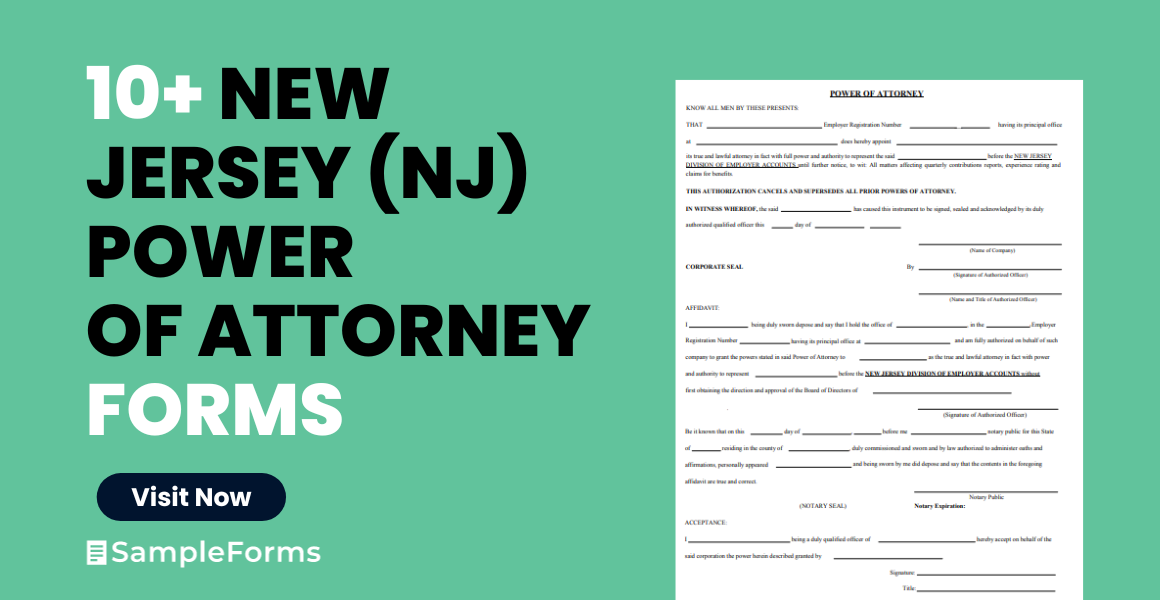Embark on securing your legal rights in New Jersey with our insightful guide on Power of Attorney (POA) Forms. This resource is designed to navigate you through the complexities of appointing a trusted individual to manage your affairs. From understanding different POA types to mastering their usage, our tips ensure a smooth, legally compliant process. Ideal for New Jersey residents seeking to safeguard their financial, health, and legal decisions, our guide is a key tool for informed empowerment.
What is the New Jersey Power of Attorney Form?
The New Jersey Power of Attorney Form is a legal document that lets you appoint someone else, known as an agent, to make decisions and act on your behalf. This could include managing your finances, property, or making healthcare decisions. The person you choose will have the authority to handle your affairs as outlined in the form, which is especially useful if you’re unable to manage them yourself for any reason.
What is the Best Sample New Jersey Power of Attorney Form?
Below is a sample template for a New Jersey Power of Attorney Form with fillable blanks. Remember, this is a basic template and may need to be customized to fit specific legal requirements or personal circumstances. Consulting with a legal professional for advice and customization is always recommended.
NEW JERSEY POWER OF ATTORNEY FORM
Principal’s Information:
- Name: [___________]
- Address: [___________]
- Phone Number: [___________]
Agent’s Information:
- Name: [___________]
- Address: [___________]
- Phone Number: [___________]
Powers Granted:
- Financial Decisions
- Real Estate Transactions
- Personal and Family Maintenance
- Business Operations
- Health Care Decisions
- Other: [___________]
Special Instructions:
- [___________]
Effective Date:
- Immediately
- Upon Disability or Incapacity
- Date: [___________]
Duration:
- Indefinite
- Specific End Date: [___________]
Signatures:
- Principal’s Signature: [___________]
- Date: [___________]
- Agent’s Signature: [___________]
- Date: [___________]
Notarization (if required):
- State of New Jersey, County of [___________]
- On [Date], before me, [Notary’s Name], personally appeared [Principal’s Name], known to me (or satisfactorily proven) to be the person whose name is subscribed to the within instrument, and acknowledged that they executed the same for the purposes therein contained.
- In witness whereof, I hereunto set my hand and official seal.
- Notary Public: [___________]
- My Commission Expires: [___________]
This form should be tailored to fit your specific needs and must comply with New Jersey state laws. Ensure that all information is accurate and the form is notarized if required.
1. State of New Jersey Power of Attorney Form
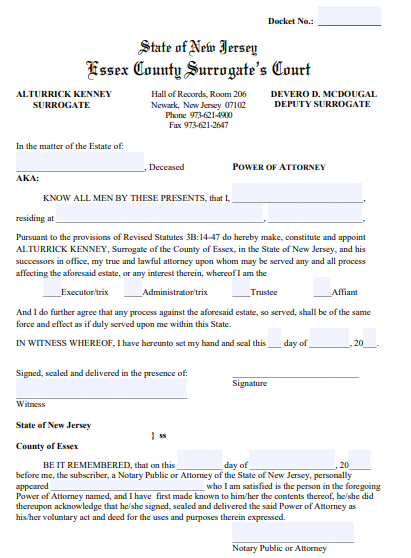
2. New Jersey Simple Power of Attorney Form
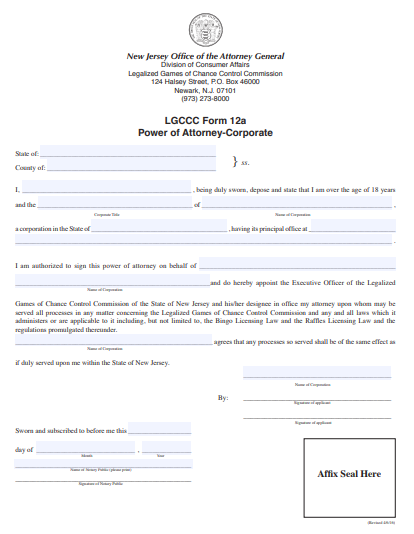
3. New Jersey Real Estate Power of Attorney Form
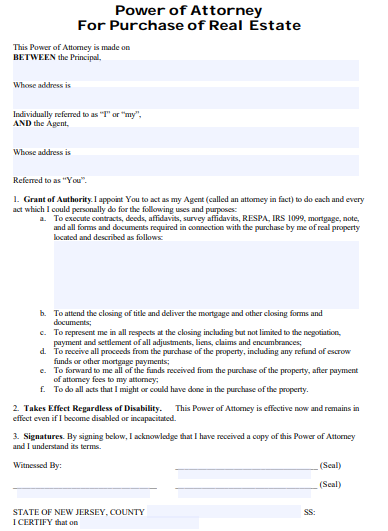
4. New Jersey Power of Attorney Form
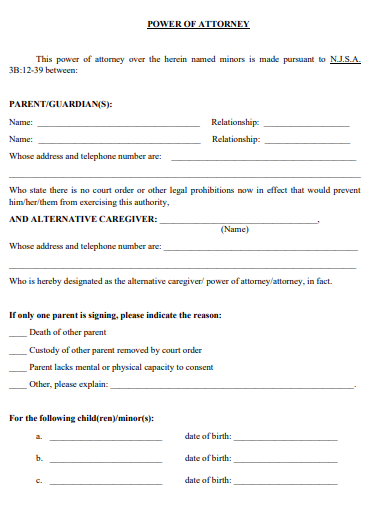
5. New Jersey Motor Vehicle Power of Attorney Form
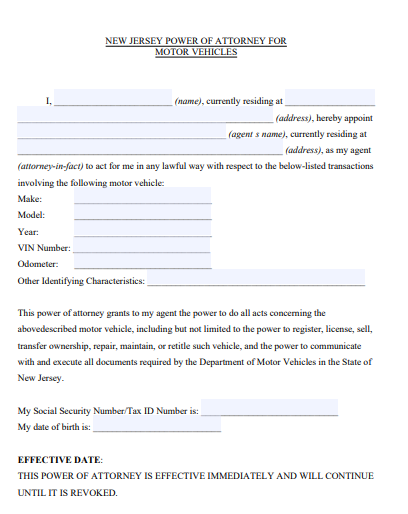
6. New Jersey Medical Power of Attorney Form
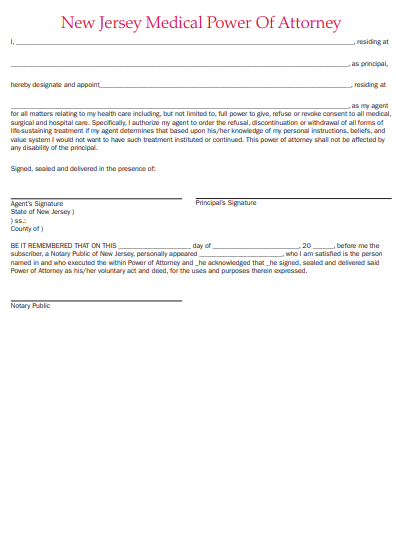
7. New Jersey Limited Durable Power of Attorney Form
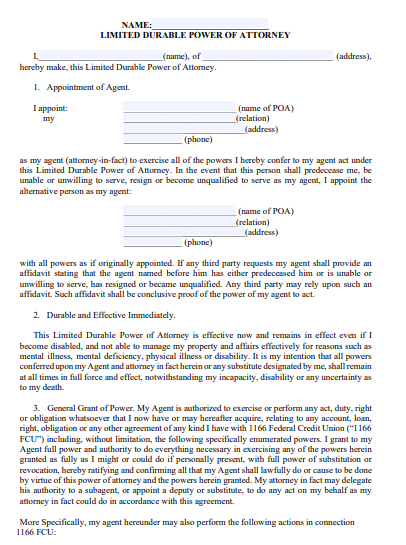
8. New Jersey General Power of Attorney Form
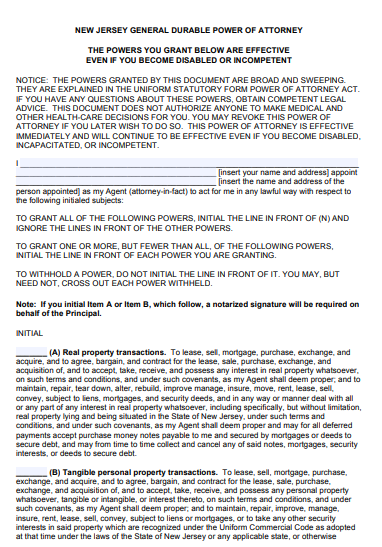
9. New Jersey Durable Financial Power of Attorney Form
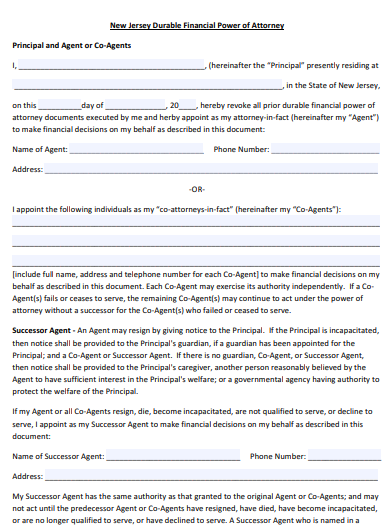
10. New Jersey Blank Power of Attorney Form
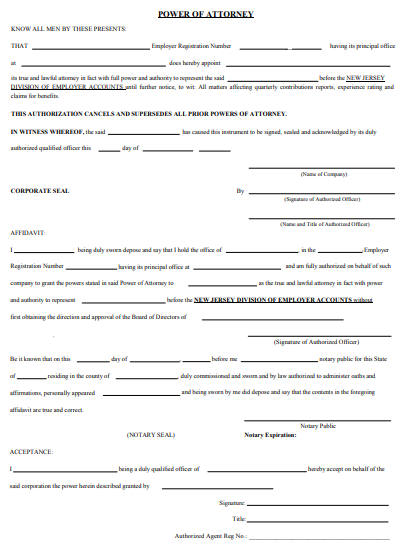
11. Free New Jersey Power of Attorney Form
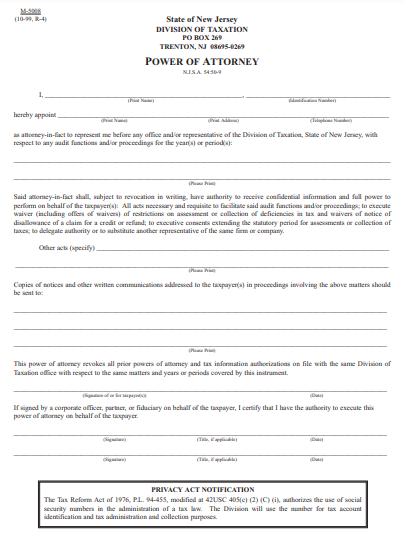
How Do I Get Power of Attorney in New Jersey?
Obtaining a Power of Attorney in New Jersey involves selecting an agent, completing the appropriate POA form, ensuring it meets legal requirements, and getting it notarized.
Examples
- Choose an Agent: Select a trusted individual to act as your agent.
- Select POA Type: Determine whether you need a General, Durable, or Medical POA.
- Complete the Form: Fill out the POA form with all necessary details.
- Legal Compliance: Ensure the form complies with New Jersey state laws.
- Notarization: Get the document notarized for legal validity.
How Much Does It Cost to Get Power of Attorney in New Jersey?
The cost of obtaining a Power of Attorney in New Jersey can vary, typically involving notary fees and, if used, attorney fees for drafting the document.
Examples
- Notary Fees: Small fee for notarization of the document.
- Legal Consultation: Costs associated with hiring an attorney for drafting.
- Document Preparation Services: Fees for online or in-person services.
- Filing Fees: Any costs for filing the document with relevant authorities.
- Legal Document Software: Expenses for using legal document creation software.
What Is a Special Power of Attorney in New Jersey?
A Special Power of Attorney in New Jersey grants an agent specific, limited powers, usually for particular tasks or transactions, unlike a General POA.
Examples
- Real Estate Transactions: Authorizing property sales or purchases.
- Financial Management: Handling specific financial tasks or accounts.
- Business Operations: Managing certain business-related decisions.
- Legal Matters: Representation in specific legal proceedings.
- Healthcare Decisions: Making medical decisions under certain conditions.
Do You Need a Lawyer to Get a Power of Attorney in NJ?
While not mandatory, consulting a lawyer can ensure that a Power of Attorney in New Jersey is legally sound and tailored to your specific needs.
Examples
- Complex Estates: For intricate financial or estate planning.
- Business Interests: When business assets are involved.
- Medical POA: For detailed healthcare directives.
- Legal Compliance: Ensuring adherence to state laws.
- Dispute Prevention: To avoid future conflicts among family members.
Is a NJ Attorney a Notary?
In New Jersey, an attorney can also be a notary public, but not all attorneys are notaries. It’s a separate certification.
Examples
- Dual Role: Some attorneys are also certified notaries.
- Separate Certification: Notary public is a different qualification.
- Legal Documents: Attorneys can draft and notarize documents.
- Verification Services: Notaries verify signatures and identities.
- Legal Advice: Attorneys provide legal advice, notaries do not.
Does a Spouse Automatically Have Power of Attorney in New Jersey?
In New Jersey, a spouse does not automatically have Power of Attorney. A POA must be explicitly granted through a legal document.
Examples
- Legal Documentation: A POA must be formally written and signed.
- Healthcare Decisions: Separate authorization needed for medical decisions.
- Financial Matters: Spousal authority for finances requires a POA.
- Estate Management: Managing assets needs explicit POA authorization.
- Legal Representation: Representing a spouse in legal matters requires a POA.
Who Makes Medical Decisions If There Is No Power of Attorney in New Jersey?
If there’s no Power of Attorney in New Jersey, healthcare decisions are typically made by close family members or through a court-appointed guardian.
Examples
- Spouse or Partner: Usually the first choice for decision-making.
- Adult Children: If no spouse, adult children may decide.
- Close Relatives: Siblings or parents can be decision-makers.
- Court-Appointed Guardian: In absence of family, a guardian is appointed.
- Medical Ethics Committees: In some cases, hospital committees make decisions.
How to Prepare a New Jersey Power of Attorney Form
Understanding the Purpose
Firstly, understand the purpose of a Power of Attorney (POA) in New Jersey. It’s a legal document allowing someone to make decisions on your behalf, covering areas like finance, health, or legal matters.
Choosing the Right Type of POA
Decide on the type of POA you need: General, Durable, Medical, or Limited. Each serves different purposes, such as a Durable POA, which remains effective if you become incapacitated.
Selecting Your Agent
Choose a trustworthy individual as your agent. This person should be reliable, understand your values, and capable of making decisions in your best interest. Consider their proximity, availability, and willingness to take on this responsibility.
Drafting the Document
Use a standard New Jersey POA form or seek legal assistance for drafting. The form should include your name, the agent’s name, the powers granted, and the conditions under which the POA becomes effective.
Defining Powers and Limitations
Clearly outline the powers you are granting to your agent. Specify what they can and cannot do to avoid future misunderstandings or misuse of the POA.
Legal Requirements
Ensure that the POA complies with New Jersey state laws. It typically needs to be signed by you and notarized. Some forms might have additional requirements, especially for a Medical POA.
Signing and Notarization
Sign the document in the presence of a notary. This step is essential for the legal standing of the POA in New Jersey. The notary public will verify your identity and your intention to sign the document.
Distributing Copies
Provide a copy of the signed POA to your agent and keep one for your records. Inform relevant parties, such as your bank or healthcare provider, about the POA.
Regular Updates
Review and update your POA periodically. Changes in your life situation or New Jersey law may necessitate adjustments to your POA.
Tips for Using Effective New Jersey Power of Attorney Form
Choosing the Right Agent
Your agent should be someone who communicates effectively, understands your preferences, and respects your autonomy. Their ability to make informed decisions under pressure is crucial.
Specificity in Powers Granted
Define the scope of authority in clear terms. This precision in the POA document ensures that your agent acts within the boundaries you’ve set, leading to more effective decision-making.
Communicating Your Wishes
Have an open discussion with your agent about your expectations and wishes. Clear communication is key to ensuring that your agent makes decisions that align with your preferences.
Seeking Legal Advice
Consider consulting a lawyer who specializes in New Jersey POA laws. They can provide guidance on drafting an effective POA and ensure it meets all legal requirements.
Regular Reviews
Life changes can affect the relevance of your POA. Regularly review and update the document to reflect your current wishes and circumstances, maintaining its effectiveness.
Educating Your Agent
Ensure your agent understands their responsibilities and the extent of their powers. Educating them about New Jersey laws related to POA can lead to more informed and effective decision-making.
Accessibility of the Document
Keep the POA document accessible to your agent and relevant parties. In emergencies, quick access to the document is crucial for effective action.
Monitoring the Agent’s Actions
Regularly check in on your agent’s decisions. This oversight ensures they are acting in your best interest and according to your specified terms.
Planning for Contingencies
Include provisions for alternate agents in case your primary agent is unable or unwilling to serve. This foresight ensures continuous effective management of your affairs.
Respecting Your Wishes
Ensure your agent respects and adheres to your wishes. Effective communication and a mutual understanding of expectations are key to a successful POA arrangement in New Jersey.
What Are the Requirements for Power of Attorney in New Jersey?
In New Jersey, a Power of Attorney must be in writing, signed by the principal, and notarized. The principal must be competent and understand the document’s implications.
What Are the Limitations of a Power of Attorney?
A Power of Attorney cannot override the principal’s wishes, make decisions after the principal’s death, or perform non-delegable personal duties like voting.
Who Can Override a Power of Attorney in New Jersey?
In New Jersey, a court can override a Power of Attorney if it finds the agent is acting improperly or against the principal’s best interests.
Does a Spouse Automatically Have Power of Attorney in New Jersey?
No, in New Jersey, a spouse does not automatically have Power of Attorney. It must be explicitly granted through a legal document.
What Are the Duties of Power of Attorney in NJ?
In New Jersey, a Power of Attorney’s duties include acting in the principal’s best interest, avoiding conflicts of interest, and keeping accurate records of transactions.
Do I Need a Lawyer for Power of Attorney New Jersey?
While not required, consulting a lawyer for a Power of Attorney in New Jersey is advisable for legal accuracy and to tailor it to specific needs.
Our guide demystifies the process of creating a New Jersey Power of Attorney Form. It emphasizes the importance of understanding legal requirements, choosing the right agent, and clear communication. Regular updates and legal advice ensure your POA remains effective and aligned with your needs. This guide is an invaluable resource for anyone looking to manage their affairs with confidence and legal precision in New Jersey
Related Posts
-
10+ Free Nevada (NV) Power of Attorney Form Download – How to Create Guide, Tips
-
10+ Free Nebraska (NE) Power of Attorney Form Download – How to Create Guide, Tips
-
10+ Free Montana (MT) Power of Attorney Form Download – How to Create Guide, Tips
-
10+ Free Missouri (MO) Power of Attorney Form Download – How to Create Guide, Tips
-
10+ Free Minnesota (MN) Power of Attorney Form Download – How to Create Guide, Tips
-
10+ Free Mississippi (MS) Power of Attorney Form Download – How to Create Guide, Tips
-
10+ Free Massachusetts (MA) Power of Attorney Form Download – How to Create Guide, Tips
-
10+ Free Maryland (MD) Power of Attorney Form Download – How to Create Guide, Tips
-
10+ Free Maine (ME) Power of Attorney Form Download – How to Create Guide, Tips
-
10+ Free Louisiana (LA) Power of Attorney Form Download – How to Create Guide, Tips
-
10+ Free Kentucky (KY) Power of Attorney Form Download – How to Create Guide, Tips
-
10+ Free Kansas (KS) Power of Attorney Form Download – How to Create Guide, Tips
-
10+ Free Iowa (IA) Power of Attorney Form Download – How to Create Guide, Tips
-
10+ Free Indiana (IN) Power of Attorney Form Download – How to Create Guide, Tips
-
10+ Free Illinois (IL) Power of Attorney Form Download – How to Create Guide, Tips
